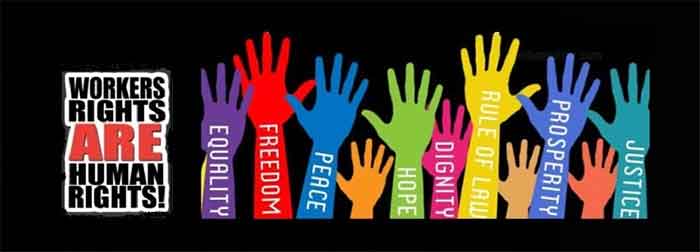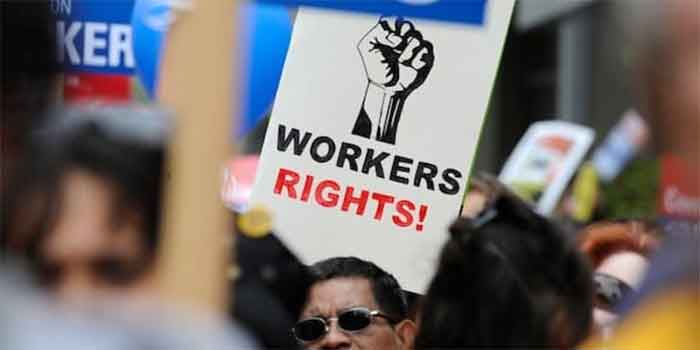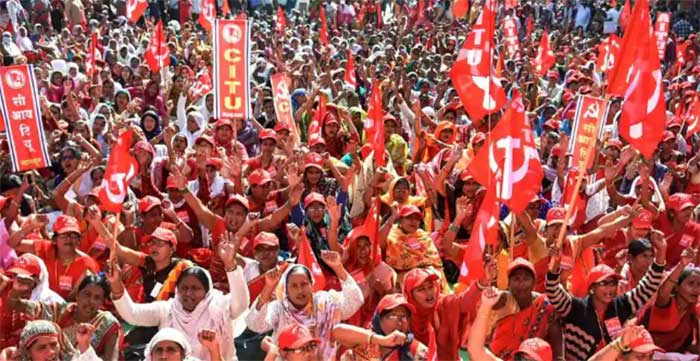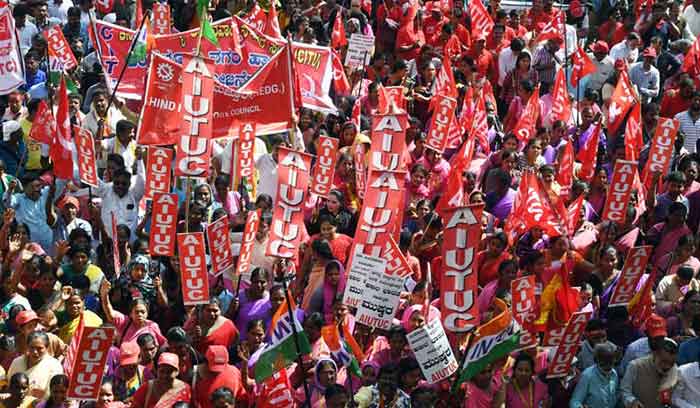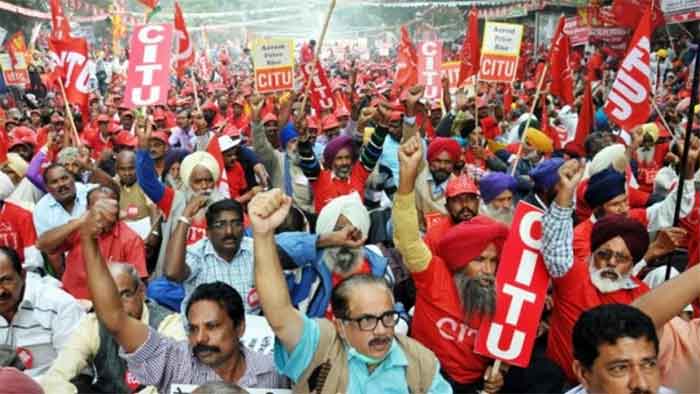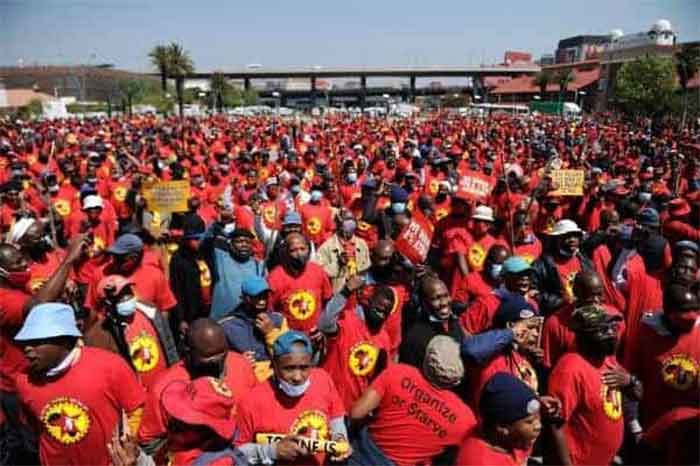
Workers in many parts of the world face similar challenges and advances as in Kenya. The situation for trade unions in many countries are also similar. In Britain, there is an increasing militancy among workers in recent years, with 2.3 million strike days in 2022, the highest since the 1984-85 miners’ strikes. This reflects the resistance to increasing oppressive practices by governments in recent years. The conditions of workers has further deteriorated as a result of the use of technologies, many of which have wholly or partly replaced workers in some industries, or changed the nature of work. The situation in India, as described by Das and Rajeesh (2023), is no different from that in Britain or Kenya
Delivery workers who constantly battle job insecurity and poor pay scales are excluded urban underclass workers… The global economic restructuring and deepening policy of liberalisation in the post-Fordist regime has created the new workplace and the new worker in India. This new model of neo-liberal economic structure is more open, informal, flat, has flexible organisational structure and work culture, characterised by despatialisation where economic processes lose their fixed spatial attachments, disembodiment and mobility of labour. This has resulted in the “liquefaction of labour,” where labour is becoming more transnationalised. Moreover, flexibilisation of labour and global informational economy have been identified as key features of work and employment. Such flexible employment arrangements have transformed work, creating longer working hours and double shifts, eroding job security, and leading to a process of individualisation. In addition, extensive use of information technology has enabled managements to exert greater control over labour through panoptical forms of surveillance and monitoring.
The emergence of e-commerce changed the entire pattern of delivery services, and made it more dynamic with the inclusion of multitude of services. There were observable new dimensions to consumption culture. In earlier times, the doorstep service was limited to that of postal department or private couriers. It had limitations over the exchange of goods as well. With the onset of Covid-19, e-commerce received a novel boost, where no contact service charmed the consumers. In this development came the new class of workers known as online delivery workers. Therefore, in recent times, food delivery services have emerged as key employers in the urban and peri-urban areas.
Yet it is this very condition of increased exploitation by capitalism that is driving increasing militancy among workers and their trade unions. In the case of India, Das and Rajeesh (2023) record one of the effects of these changes in employment practices:
The squeezed labour policies of popular corporate food-ordering apps in India have been a catalyst for delivery workers to break their silence and form a unified working class consciousness.
At the same time, because of the changing conditions, trade unions face a decline in union membership. In Britain, for instance, membership declined from 13.2 million members in 1979 to 6.7 in 2023, partly as a result of ‘a general inability to adopt to changes in the economy and society’ (Flanagan, 2023), and partly because of the loss of manufacturing jobs, for example 200,000 manufacturing jobs lost from 2010 under the Tory governments.
Trade unions in Kenya started from a low membership base as many workers were prevented by law to take industrial action. Additionally, with a large proportion of people working on the land, they remain outside the remit of many traditional trade unions. Thus, trade union density in Kenya was only 9.7%, whereas it was 81.4% in Cuba, 19.8% in India and 23.4% in UK. Further, ‘there has been remarkable decline in trade union membership [in Kenya] since the mid 1990s when retrenchment started’. The retrenchment was driven by enforced policies from the World Bank, indicating the impact of external organisations serving international finance on behalf of capitalism. Simiyu and Aura (2018) explain.
In Kenya retrenchment gained prominence the late 1980s and 1990s following the recommendation by World Bank and other lending organizations as one of the conditions of qualifying for Aid (World Bank Technical Report paper No 357, 1996).
Further, trade unions face additional legal and political controls instituted initially by the departing colonial government but reinforced by governments after independence under dictates from IMF and World Bank. The role of trade unions has been reduced so drastically over the years. ILO traces the history of early attacks on trade unions, as well as its triumph in face of these forces:
The genesis of labour law and practice can be traced to the 19th century when need arose for the colonial government to pass legislation to ensure adequate supply of cheap labour to service the emerging enterprises in agriculture, industry and in the service sector … This rigid control of trade unions was maintained by the colonial government until the end. This notwithstanding, the movement was able to grow both in numerical strength and power. At independence the total number of following [sic] was about 155,000, 52 trade unions, with four centres formed and registered, namely, East African Trade Union Congress (EATUC), Kenya Federation of Registered Trade Unions (KFRTU), Kenya Federation of Labour (KFL) and Kenya Africa Workers Congress (KAWC).
There are a number of legal hurdles created by the Government to prevent trade unions operating in the interest of workers. ILO explains this aspect of Kenyan laws and the impact it has had on trade unions:
A lawful strike takes place only when the procedure laid down in Part V of the Trade Disputes Act is exhausted. This procedure goes through the reporting, the decision of the Minister, conciliation, investigation and the Board of Inquiry, and the Industrial Court procedure described above. In effect, lawful industrial actions are difficult to obtain in Kenya under these regulations. The complex regulations and requirements of the Trade Disputes Act and the jurisdiction of the Industrial Court make it difficult to think of any situation that could justify a legal strike action in Kenya.
And so there have been many ‘illegal’ strikes, many organised, not by trade unions themselves, but by militant shop stewards. Here again, there are serious obstacles imposed by the government, as ILO shows:
Persons who declare or instigate or incite others to take part in an unlawful strike or lock out are guilty of offence and are liable to pay a fine. On the other hand persons who refuse to take part in unlawful strikes or lockouts are protected from expulsion, deprivation of any rights or benefits under section 35 of the Trade Disputes Act.
And that is not all. ILO says,:
Not all categories of workers have the right to seek, initiate and conduct a strike action. Firstly there are those who are effectively excluded by the Proclamation from its scope of application. Secondly, there are workers who do not have the right to strike under the provision of the Trade Disputes Act, sections 36, 43, First Schedule, on the ground they are engaged in essential services. These services are defined in the First Schedule and include:
Water services;
Electricity services;
Health services;
Hospital services;
Sanitary services;
Air traffic control services;
Civil aviation telecommunications services; Meteorological services;
Fire services of the Government, of Kenya Railways and the Kenya Ports Authority and of local government authorities;
Air transport;
Supply and distribution of fuel, petrol, oil, power and light;
Telecommunications, posts and telegraphs;
Public transport services provided by Kenya Railways and the Kenya Ports Authority;
Port and docks services including stevedoring and lightering, loading and unloading of cargo from or on to any ship and dispatch of cargo to destination.
The list contains a sizeable number of workers who are prevented from going on strike, thereby weakening the power of workers and unions.
But IMF and World Bank have Kenya in their tight clasp and will go to any length to ensure Kenya does not veer from capitalism. This is shown by some recent legislation. Kinyanjui sets out IMF demands from Kenya :
The Kenyan government will have to restructure nine state-owned corporations as one of its commitments to access the International Monetary Fund (IMF)’s Ksh.255.9 billion shillings support package.
Among the parastatals that have been slated for restructuring include national carrier, Kenya Airways(KQ), Kenya Power and Lighting Company (KPLC), Kenya Electricity Generating Company (KenGen), and Kenya Ports Authority (KPA).
Other parastatals include the three largest public universities namely the University of Nairobi, Kenyatta University and Moi University.
…
The IMF’s statement coincides with a call by the Nairobi Securities Exchange (NSE) for the privatisation of a number of parastatals as one of the ways of raising funds to help the government manage its fiscal deficit.
The last paragraph is instructive in understanding the real agenda behind IMF demands, as reflected by the business community — ‘privatisation of a number of parastatals’. This is clearly in the interest of the profit-hungry private sector. See the above in the context of the subsequent Government action in the Privatisation Bill 2023, as reported by The Kenyan Wall Street:
The Kenyan Cabinet has approved the Privatization Bill 2023, a state-sponsored bill that seeks to sell Govt-owned entities to the private sector without Parliamentary approval. The cabinet approval means the Ministry of Treasury will have the power to sell non-strategic parastatals without legal and policy bottlenecks.
The Government hopes that the new law will allow the private sector to contribute to the economy by owning shares in the entities and reduce the demand for government resources and reliance on government financing by the parastatals.
The Bill gives power to the National Treasury to identify and determine which public enterprises will be privatized, without the approvals of Parliament. The Privatization Commission will be turned into a parastatal called the Privatization Authority, domiciled at the Treasury, responsible for the implementation of the sale.
According to the Daily Nation Newspaper, some of the corporations that the government has earmarked for privatization include Chemelil Sugar, South Nyanza Sugar, Kabarnet Hotel, Mt Elgon Lodge, Golf Hotel, Nzoia Sugar, Miwani Sugar, Sunset Hotel Kisumu, Kenya Safari Lodges and Hotels, Consolidated Bank, Development Bank of Kenya, Agro-Chemical and Food Company, Kenya Wine Agencies, Kenya Meat Commission, and public universities.
According to the Cabinet dispatch, the sale of non-strategic, non-performing public entities will help finance the upgrade of infrastructure and improve the delivery of services to Kenyans. It will also generate revenues for the government, reduce conflicts between the public sector’s regulatory functions and commercial functions, and develop Kenya’s capital markets.
The approval of the Privatization Bill 2023 comes just five months after President William Ruto stated that the government is seeking to privatize ten state firms within a year through the Nairobi Securities Exchange.
In view of the dictates from IMF, it is difficult to see how trade unions can fight for industrial or political needs of workers. Added to these difficulties, there are economic and social factors which make the strike action even more difficult. With a large army of unemployed people created by capitalism, those who are employed find it difficult to take strike action for fear of losing their jobs, as many unemployed people are ready to take their job. The social factors that support strike action in earlier years are gradually being eroded. Support from extended family is difficult and many people no longer have the links with their rural family structures which could have supported them. It is indeed an achievements for workers to take up the strike weapon at all.
The Way Ahead
Flanagan (2023) asks the question ‘Are the unions back?’ In the context of Britain ‘hundreds of trade union delegates are gathering to look at the challenges and opportunities facing the movement.’ He suggests some possible action that can support trade unions:
The answer was always the revival of the power of the rank and file movement of 1960s and ’70s Britain. We can also see better examples from other parts of the world, including India and parts of the global South, where trade unions are engaged not just in rebuilding membership but taking up political challenges, opposing governments — or even, as in Bolivia, protecting governments.
However, in Kenya, there is no militant trade union movement that can advance the real interests of working people, nor is there a political party that is concerned about worker rights. Yet, when the situation gets as difficult as it is in Kenya is the very time when revolutionary movements emerge.
An important fact about trade union movement emerges from the experience in Kenya. This is that the colonial government attacked trade unions not only because of their industrial action. ILO, in the report quoted earlier, gives the real reason for these attacks:
Industrial confrontation arose not merely from traditional trade union activities, but also from the movement’s political role in the struggle for freedom from colonial domination, particularly after individual political leaders had been arrested and placed in detention.
The action that took place after the arrest of political leaders was nothing short of the armed struggle waged by Mau Mau in which trade unions played an important role. The East African Trade Union Congress had combined its industrial action with political action, as they saw that workers rights could not be met by industrial action alone. Trade Unions had to become active in the political sphere too if they were to wage a successful war against capitalism. That was the ultimate war that they are engaged in. Becoming politically active is an essential requirement for trade unions today.
Another requirement is to re-examine the political landscape they exist in. Narrow fights with strikes, however necessary, will not lead to the working class achieving state power to rule on behalf of working class.
A lesson that can learnt from the experience of Mau Mau and the trade union movement was that, given the difficulties of organising the proletariat, they joined hands with peasants, the pastoralists, the unemployed, the landless and those struggling and surviving in the so-called ‘informal sector’, as well as rural workers. It is only in joint action with them that victory can come in sight.
Trade Unions also need to broaden their horizons from the narrow confines of shop-floors and workplaces. Connect with them wherever they are: in factories and industries; in shops and on the streets; in the jug kali industries. Find them in the slums, and poor and not-so-poor housing in local communities all over the country. If trade unions are to success, they need to be active in the community, supporting and being part of community life as trade unionists.
Trade unions also need to take advantage of the tools of mass communication made possible by new technologies. Communicating with fellow-workers and communities is essential for their struggle, as is a programme of broadening their outlook and expanding their horizons and to educate them about socialist ideology and to explain the damage that capitalism does to their lives. Use works of revolutionary fiction to do all that. Only by opening their minds to their economic, social, political environment in the global context will trade unions have any prospects of winning power on behalf of working class in partnership with working classes from around the world.
The voice of workers and trade unions should become a key voice in the country where only the bourgeois voice is heard today.
This article is the fourth briefings on trade unions in Kenya. The others are:
Capitalist Exploitation Entrenched in Kenya. 26-05-2023. https://countercurrents.org/2023/05/capitalist-exploitation-entrenched-in-kenya/
Trade Unions in Kenya and Britain in a Changing World. 27-5-2023. https://countercurrents.org/2023/05/trade-unions-in-kenya-and-britain-in-a-changing-world/
What role did trade unions play in the struggle for independence in Kenya? 28-05-2023. https://countercurrents.org/2023/05/what-role-did-trade-unions-play-in-the-struggle-for-independence-in-kenya/
Shiraz Durrani is a Kenyan political exile living in London. He has worked at the University of Nairobi as well as various public libraries in Britain where he also lectured at the London Metropolitan University. Shiraz has written many articles and addressed conferences on aspects of Kenyan history and on politics of information in the context of colonialism and imperialism. His books include Kenya’s War of Independence: Mau Mau and its Legacy of Resistance to Colonialism and Imperialism, 1948-1990 (2018, Vita Books). He has also edited Makhan Singh – A Revolutionary Kenyan Trade Unionist (2017, Vita Books) and Pio Gama Pinto: Kenya’s Unsung Martyr,1927 – 1965 (2018, Vita Books). He is a co-editor of The Kenya Socialist. and edited Essays on Pan-Africanism (2022, Vita Books, Nairobi). His latest book (2023) is Two Paths Ahead: The Ideological Struggle between Capitalism and Socialism in Kenya, 1960-1990. Some of his articles are available at https://durranishiraz.academia.edu/research and books at: https://www.africanbookscollective.com/search-results?form.keywords=Shiraz+Durrani

